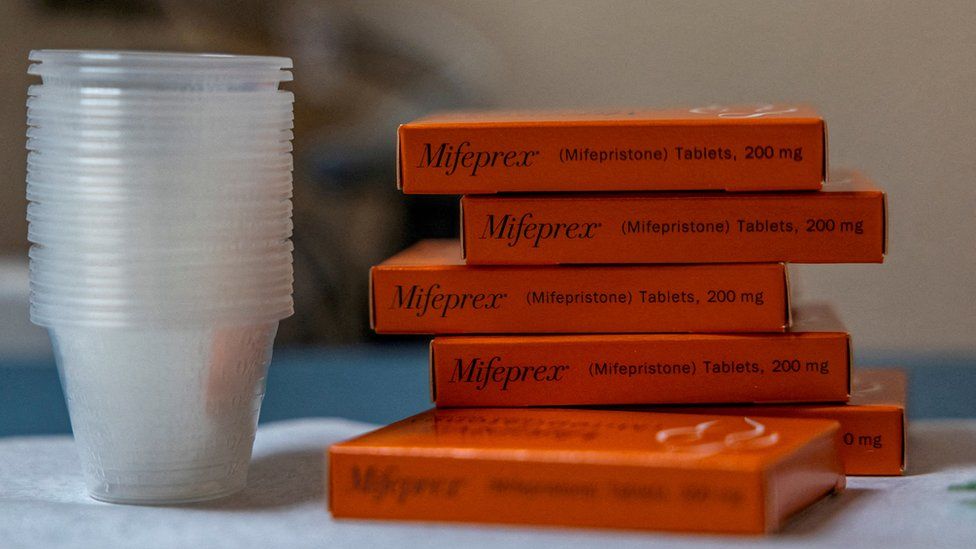What comes next for the abortion pill in the US?
The US Supreme Court has decided to keep a commonly used abortion pill on the market while a lawsuit in a lower court continues.

A Texas judge suspended approval of the abortion drug mifepristone on 7 April, questioning its safety.
The ruling now returns to the New Orleans-based 5th Circuit Court of Appeals for review.
This means access to mifepristone remains unchanged - for now.
Here's how we got here.
What has happened so far?
Earlier this month, a federal judge in Texas suspended FDA's approval of the drug after a group of anti-abortion health professionals sued the agency alleging mifepristone was not safe.
It was the first time in US history a court had bypassed the federal agency to rule on a drug's market approval.
The pill - used in more than half of abortions in the US - was first approved by the Food and Drug Administration (FDA) in 2000. The drug is also approved for use in several countries, including the UK and Canada.
In his ruling, Judge Matthew Kacsmaryk said the FDA had rushed the approval and did not properly consider side effects. The FDA and several leading health organisations, such as the American Medical Association, say the drug is safe and effective.
Minutes later, a federal judge in Washington state issued an opposing ruling, ordering the FDA to make no change to the drug's availability and preserving access to mifepristone in 17 US states and the District of Columbia.
With these two rulings directly contradicting each other, the government appealed to the New Orleans-based 5th Circuit Court of Appeals.
It also asked for the court to put the Texas order on hold while the appeal was heard, keeping mifepristone available.
The appeals court agreed to keep the drug on the market - but with additional restrictions, such as only being available for use in the first seven weeks of pregnancy and requiring the drug to be dispensed in person by a physician. The restrictions also revoked the 2019 approval of the generic form of the drug.
Mifepristone should stay on the market, the court ruled, because it was too late to challenge the 2000 approval. But it was not too late, it said, to challenge changes made to the approval after 2016 that significantly expanded access.
Last week, the US justice department and Danco Laboratories, which manufactures the drug, called on the Supreme Court to intervene and strike down these restrictions while the appeal is being considered by the lower court.
It argued that the status quo should be maintained, because changing the FDA's rules would "create significant chaos for patients, prescribers, and the health care delivery system".
Last Friday, US Supreme Court Justice Samuel Alito, who oversees emergency matters for the 5th Circuit, ordered a temporary stay on the restrictions until Wednesday evening.
On Wednesday afternoon, the Supreme Court further extended this deadline until Friday.
This Friday, it issued a decision allowing the drug to remain on the market without any of the restrictions imposed by the lower courts.
The Supreme Court - which has a 6-3 conservative majority - did not offer an explanation as to why. But two of the conservative judges - Justice Alito and Justice Clarence Thomas - dissented, which means they disagreed with the court's decision.
In his written dissent, Justice Alito said "at present, the applicants are not entitled to a stay because they have not shown that they are likely to suffer irreparable harm in the interim".
What happens next?
Access to the abortion pill mifepristone across the US will hinge on what happens during the lengthy appeals process.
The Supreme Court's stay on the ban is valid until the appeals process ends.
Right now, the case is being heard by the 5th Circuit Court of Appeals. Oral arguments for that appeal begin on 17 May.
With the Washington and Texas court rulings in direct conflict with another, it is unclear which rule will apply.
The FDA cannot both remove its approval, as instructed by the Texas court, and keep access to the drug, as instructed by the Washington court.
Whichever way the 5th Circuit Court of Appeals decides, it's likely that the other side will appeal to the Supreme Court.
Legal experts say that the Supreme Court is expected to take it up because it has wide-reaching implications on national drug policy.
What might this all mean for other drugs?
Critics say that by overriding the FDA's approval, the court in Texas usurped the federal health agency's remit to regulate food, medicine, and medical devices.
The Food, Drug, and Cosmetic Act of 1938 gives the FDA the authority to determine whether drugs are safe and effective. Typically, courts have deferred to the agency when it comes to scientific and medical decision-making.
Legal experts warn the ruling opens the door for challenges to other approved medicines in the US and could also stifle development of future drugs.
I. Glenn Cohen, a Harvard Law School professor, told BBC News the pharmaceutical industry could face more legal challenges, particularly to treatments that have become political flashpoints in the US, like transgender medical treatment and Covid-19 vaccines.
"It's possible in any space, but … it's going to trickle down in some ways and play out to be the worst for drugs that are needed sometimes by discrete and insular minorities," Prof Cohen said.
-bbc






